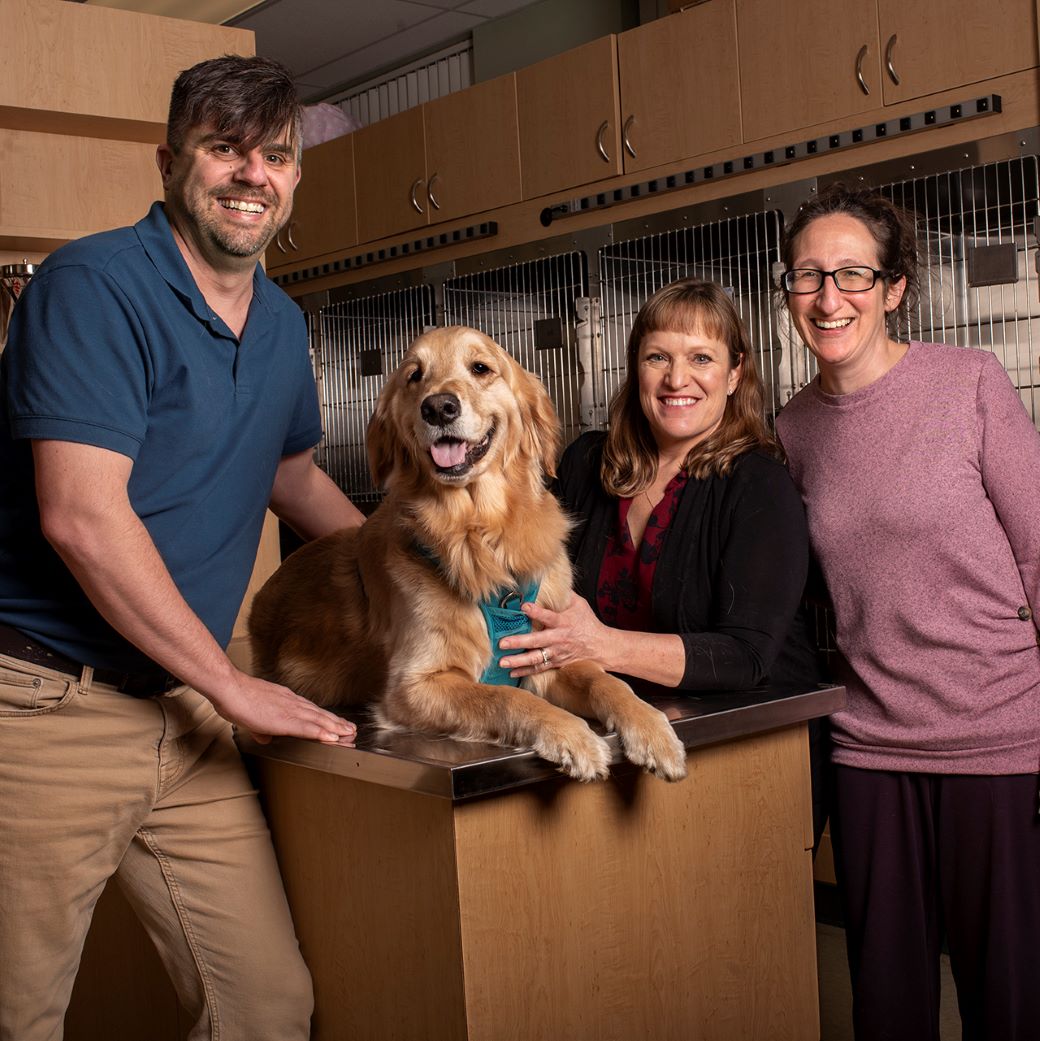 Listen to this story.
Listen to this story.
Rochester vets

Photo by Michelle Gabel
Drs. Bruce Ingersoll, Brenda Buck and Dori Marion pose with Ingersoll's dog, Corsair, at the Animal Hospital of Rochester, where they will begin seeing emergency cases after hours on weekdays and round-the-clock on weekends beginning in February. The practitioners recently started a nonprofit organization to offer overnight care after the city's only emergency hospital closed late last year.
When the owners of the only emergency veterinary hospital in Rochester, New York, announced in August that the practice would shut down within three months, it was a blow for local pet owners and employees but not a total surprise. Veterinary Specialists and Emergency Services (VSES) had been scaling back hours since early in the year, citing a shortage of veterinarians.
Hundreds of people lamented the closure on social media. "I've developed a significant fear of nighttime because of my pets and not having the resources nearby to help them," one resident wrote on Facebook in September. A Reddit user posted the same month, "Cool, can add 'pet dying in my car on the way to Buffalo in the middle of the night' to my list of anxieties." The closest 24-hour hospitals are now in Buffalo, Ithaca and Syracuse — 65 to 90 miles from Rochester.
Among the comments were calls for the people of Rochester, population 210,000-plus, to find a way to preserve after-hours care.
A trio of local practitioners coalesced in the breach. Drs. Brenda Buck, Bruce Ingersoll and Dori Marion are bootstrapping a plan to get Rochester the overnight emergency veterinary care it needs by Feb. 1.
Under the auspices of a new nonprofit organization they formed called Rochester Emergency Veterinary Services (REVS), they plan to accept patients after hours on weekdays and continuously over the weekend at the Animal Hospital of Rochester, which is Buck's practice. Buck and Ingersoll will cover some shifts, and as many as 20 other veterinarians have agreed to fill in where needed. (REVS application for 501(c)(3) status is pending with the Internal Revenue Service.)
"Unfortunately for the community, they are going to have to still exercise a lot of patience with us," Ingersoll said during a press conference in December. "We're going to be taking the most critical, the most in-need patients. Some of those patients we may be turning away and saying, 'You need to go to urgent care tomorrow' or 'You are going to have to go to one of the other facilities, still.' "
Buck, Ingersoll and Marion have hired a practice manager and are interviewing veterinarians and support staff. In the short-term, they are aiming to fill four full-time-equivalent veterinarian and 30 support staff positions.
Long-term, the three veterinarians aim to open a standalone emergency hospital. They hope that nonprofit status will allow them to be a community asset and avoid the pressure to generate high returns for investors that can weigh on hospitals owned by big corporations.
From mainstay to gone
The emergency hospital that closed, VSES, had been an anchor in Rochester. Once staffed by more than a dozen emergency doctors and specialists, it was locally owned for most of its nearly 30 years. Pathway Vet Alliance bought it in 2021, part of a dramatic run of consolidations among veterinary practices during the pandemic. Pathway has since changed its name to Thrive Pet Healthcare. Based in Texas, Thrive owns more than 380 practices in 37 states, according to its website.
After the purchase, VSES began losing doctors and faced discontent among support staff, who voted to unionize in January 2022. VSES is the third hospital to close during union negotiations in three years.
Staffing shortages led VSES last January to stop accepting patients after 10 p.m., but the hospital continued keeping animals overnight with a veterinarian on the premises. By early August, VSES reduced its hours again and eliminated overnight care. Days after that announcement, Thrive said it would close the hospital altogether. The last day was Nov. 27.
Buck said the consequences of losing local emergency services have been dire. "Pets are literally dying because they're not making it on the drive, or owners don't have the ability to go that far," she said.
The fact that many of the 24-hour hospitals closest to Rochester are already stretched thin further complicates matters.
"Even though there are these other practices, they're already full and busy and maybe not fully staffed, and so they don't have the capacity to absorb all the emergencies in Rochester," Buck said. Some pet owners arrive at a hospital only to face long waits or be diverted elsewhere.
'We're doing this'
A Rochester native, Buck joined the conversation when community leaders and veterinarians began brainstorming alternatives in late summer. Marion, who moved to the area in 2007 and owns a multi-doctor mobile practice called Doorbell Vet, participated, as well.
Marion said early efforts to enlist former VSES doctors or others in the community to start an ER were discouraging. Some VSES doctors had already left the area, some had signed contracts for new jobs locally, most were worried about the constraints of noncompete agreements they signed with Thrive, and "no one seemed eager to take on the tremendous responsibility of owning, managing and running an emergency hospital even with the help and support of the local veterinary community."
Soon, the community brainstorm spun off three individuals talking among themselves: Buck, Marion and Ingersoll, who grew up in the area, practices at a hospital southwest of Rochester and teaches in a veterinary technician program at a community college. Each has a full plate at work, and Marion has a new baby, but they were motivated by a shared vision and inspired by two examples: Angell Animal Medical Center in Boston and the Schwarzman Animal Medical Center in New York City, both 24/7 emergency specialty referral hospitals that are nonprofits.
"[These are] two of the most successful veterinary emergency practices in the country," Buck said. "It was kind of like, 'How can we do this and give back to the community?' We really embraced this idea."
Rochester clinic

Photo by Michelle Gabel
The former home of Veterinary Specialists and Emergency Services in Rochester, photographed last week, shows no sign of having been home to a nearly 30-year-old practice that once had more than a dozen veterinarians and more than 100 support staff offering 24-hour care. Thrive Pet Healthcare closed the facility in November, fewer than three years after buying it.
Marion believes being a nonprofit is good for the community and will attract veterinarians. "Profits could go back into improving the clinic and pay for all staff," she said, and into creating funds to help pet owners who can't afford care. She also said nonprofit status could provide a recruitment incentive — staffing being something she recognizes will be their toughest challenge — as it could enable practitioners with federal student debt to qualify for Public Service Loan Forgiveness.
Buck, who interned at VSES 20 years ago, said the group also wants to bring back an internship program that was dropped by Thrive, with the hope that it will draw new doctors to the community who will opt to stay. "Doctors [would] come do their internships for a year, and they would sign on to work emergency or they would go into one of the general practices because Rochester is a great community," Buck said. "If we bring back the internship program, we can bring veterinarians back into this community."
Feeling the urgency of the coming closure, the partners decided during a three-way phone call one night in November that it was time to act. "The three of us just said, basically, 'Eff it' — excuse me — 'we're doing this.' And so, we contacted our attorney, and we all pitched in the money to file for nonprofit status," Buck said.
They established REVS and became its board members.
Outpouring of support
The upstart effort has attracted hands-on support from Congressman Joseph Morelle, who represents a district that includes Rochester. "Even though it's not typically what a member of Congress might do," he told the VIN News Service, "for me, it was just imperative for my community."
At first, his staff suggested he write to the Federal Trade Commission to raise concerns about a private-equity-owned company buying a business and closing it soon after. Thrive is owned by TSG, an international private equity company focusing on consumer products.
But, Morelle said, "The company that's leaving isn't what interests me because, you know, my neighbor, who has a little dog that she walks four or five times a day, she's not going to benefit from the fact that I wrote a letter. She's going to be more interested in how we replace that service."
He's been focused on helping REVS find government funding, including working with the Monroe County officials to secure in December a $100,000 grant from the county industrial development agency.
He's also nudged the Internal Revenue Service to expedite the processing of the group's nonprofit status and convinced Thrive to release its VSES veterinarians from their noncompete obligations.
The congressman said the experience opened his eyes to the broader workforce challenges in veterinary medicine — awareness he said is spurring him to look for longer-term solutions, such as exploring expanding the scope of practice for veterinary technicians without displacing veterinarians.
Rochester residents have also stepped up, donating $80,000 by the end of 2023 without any organized fundraising effort on the part of REVS's veterinarian founders. Prompted by a news story about the initiative, Rochester café and food truck owner Jessica Quigley rallied fellow food-truck owners to host a fundraiser.
"It was such a relief that these doctors would be willing to do this," she said. "We have to show them support." The event raised $3,000.
The doctors say they are feeling the love and hope they can serve as an example for other communities.
"Corporate medicine has really taken over a lot of veterinary medicine, and it's changed the atmosphere a bit," Buck said. "I feel like this nonprofit brings veterinary medicine back to its grassroots."